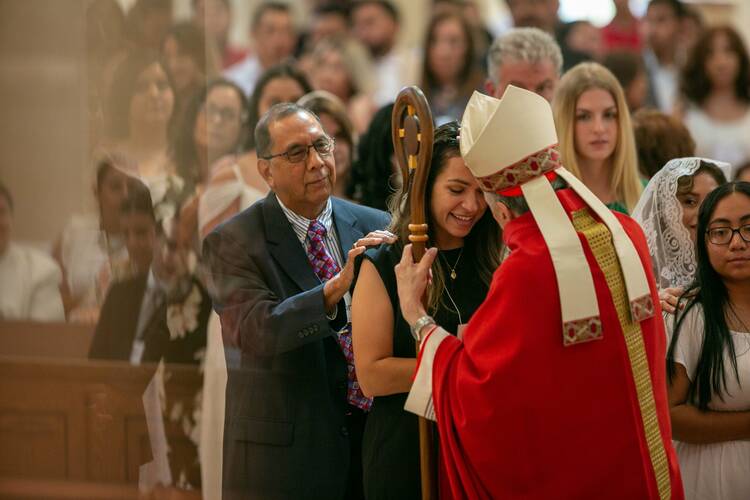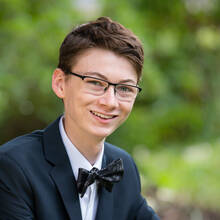Last year, a few hours before the dawn of Easter Day, at the age of 19, I was confirmed in the Catholic Church. Being confirmed at that age may strike some Christians today as strange. Probably most Roman Catholics in the United States today were confirmed in their pre-teen (or perhaps early teen) years. To a Christian in the early church, being confirmed at that age would have seemed even stranger, as confirmation was then done at the same time as baptism.
Throughout the Middle Ages, as church doctrine and practice slowly evolved, the sacraments of initiation (baptism, confirmation and Communion) became separated. By the time of the Council of Trent (mid-16th century), it was thought that confirmation and Communion were more appropriate for people who have grown capable of the “use of reason,” understood to be 7 years old or older. In any case, being confirmed at age 19 was never the norm.
And for me, in part because it happened later than the usual age and of my own volition, my confirmation was a deeply meaningful and happy affair. Many young Catholics I know were compelled to be confirmed by family members who felt the sacrament was important. These adults trust that, while the young person may not be enthusiastic about it right now, eventually he or she will be grateful to have been confirmed. My situation was the opposite—my parents never considered asking me to be confirmed, for their relationship to the church is anything but trusting.
Last year, a few hours before the dawn of Easter Day, at the age of 19, I was confirmed in the Catholic Church. Being confirmed at that age may strike some Christians today as strange.
I was born seven months after The Boston Globe began publishing its findings on sexual abuse by priests. My father felt his children should have nothing to do with the church, and only after considerable delay was I baptized. Still, my mother dutifully took me to Mass and Sunday school for many years. By the time I was 12, however, my mom’s theology and politics had reached a breaking point with Catholicism, and she moved us to the local Episcopal church. A few years later, I enrolled in a high school that belonged to the Evangelical Covenant Church, which is about as American Protestant as it gets.
Fortunately, my high school was so Protestant that in my anti-authority phase, I deemed the best form of rebellion would be to associate myself with Catholicism.
Fortunately (as I see it now), my high school was so Protestant that in my anti-authority phase, I deemed the best form of rebellion would be to associate myself with Catholicism. By another stroke of luck (or grace), I ended up at Fordham University for college. The charismatic Jesuits at the altar inspired me to come to Mass weekly, then to get involved myself as an acolyte and a singer, and finally to speak with a priest about getting confirmed.
As convoluted as my path to confirmation was, I now feel that I was blessed that it happened that way. My confirmation was immensely meaningful and rewarding. It could not have been that way if it had not happened when it did and where it did.
Beginning in September of my sophomore year, I attended biweekly meetings with Father Lito, Fordham’s director of campus ministry, for a rather hasty education in catechism and spirituality. My classmates included another Fordham undergrad, one or two people who needed confirmation because they wanted to be married in the Catholic Church and some graduate students who had recently converted to Catholicism.
These classes were an opportunity for me to grapple finally with many of the questions about the faith that had long puzzled me: If it isn’t truly bread, why does the Eucharist taste like bread? What does it mean to be a part of “the body of Christ”? But our meetings weren’t all theology: Often, they were filled with laughter as Father Lito amused us with his best Catholic jokes (“A Dominican, a Franciscan and a Jesuit were walking around a church.…”) and stories from his long time at Fordham.
In addition to taking classes, I spent weeks searching for a name. I jokingly mused over a more obscure name: “Bildad,” for Bildad the Shuhite, the shortest person in the Bible. (Say his last name out loud). “Ignatius” was also a contender, of course, as well as “Francis.” But one evening, flipping through pages of Robert Ellsberg’s All Saints, I stumbled upon St. James the Less. As the author of the Epistle of James (which was termed the “Epistle of Straw” by Martin Luther), James was perfect for me. It simultaneously evoked a commitment to social justice, which is so well-articulated in James (“faith without works is dead”), and a lighthearted repudiation of my Protestant education.
Confirmation does not simply formally identify me with the Catholic Church. It also missions me to be an advocate for Christ and his church, and it endows me with the gifts of the Holy Spirit.
It was a far different experience than most of my friends had. Most of my Catholic friends, who were confirmed in their early teens, have told me that they approached the preparation for the sacrament of confirmation as something to be endured rather than as an opportunity. Many say they paid little attention to the name they chose or the readings for class. Many of these same friends are not practicing Catholics today. I now teach catechism for a class of eighth-grade confirmation candidates, and I see in them some of the same resistance my friends described feeling.
I was to be confirmed at college, over a thousand miles from Minnesota, where I grew up, but I did not feel far from home. My parents made the trek to New York, as well as my godmother and even a friend from high school. My New York cousins, who had so graciously accepted me into their fold and put me up for two weeks of Covid-19 quarantine when I first came here, were all present. The sight of them, plus many of my college friends (most of whom hadn’t been to a Mass in months or years), settling in for the two-and-a-half-hour Easter Vigil ensured me that I was home.
I didn’t join my family in the pews, however. I assisted at that Mass as an altar server, as I do at most Masses I attend at Fordham. Yet it wasn’t like most Masses: I was distracted all through the first half of the service, knowing that this would be one of the most important Masses—one of the most important moments—of my life so far. For that is truly what it was. Confirmation does not simply formally identify me with the Catholic Church. It also missions me to be an advocate for Christ and his church, and it endows me with the gifts of the Holy Spirit. This means that my life really has to be different—I cannot act as if it is merely my own. I am committed to God now, and the thought makes me want to sing with joy.
How can we create this kind of experience for more young people? We need to think about what we can do to help the church become something that young people want to freely choose to be a part of, as I did. I am sure that Catholics—especially Catholic parents—are only trying to do what they feel is best for their children by having them participate in confirmation prep and the sacrament. But they also should know how grace-filled it can be for an individual to choose confirmation. Some friends have told me, for instance, the saint’s name they would have chosen now that they know themselves better.
Individual dioceses and schools could also improve the way we prepare for confirmation in this country: better catechesis, for a start, and a later standard age for confirmandi.
Some Catholics have proposed that one way to solve the issue of teens feeling forced into a rote activity that has little meaning to them is to return to the practice of administering the three sacraments of initiation all at once. This was done in the early church and is still done in Eastern Rite churches today for infants. It is also done in countless Catholic churches throughout the world every year for adults who are entering the Catholic Church during the Easter Vigil. It might help emphasize the aspect of full inclusion in the church from an early age.
Individual dioceses and schools could also improve the way we prepare for confirmation in this country: better catechesis, for a start, and a later standard age for confirmandi. If the church has decided that a person should be confirmed once he or she has gained the “use of reason,” it follows that we should allow people to follow their own reasoning as to whether and when they should be confirmed. If they do choose to be confirmed, what if dioceses offered confirmations at more than one stage for young people: maybe 8th grade and junior year of high school, and the candidate can pick?
Primarily the solution lies with the parents. If confirmation is to be meaningful, children need to know that they are free to wait until they’re ready to receive the sacrament—or not to receive it at all. Parents, therefore, should become comfortable with letting their children decide for themselves when they will be confirmed.
Standing before my own parents at the Easter Vigil, along with other loved ones and my Fordham community, I received the sacrament of confirmation and was sealed by the Holy Spirit. I felt my life become new, my purpose clear: I am a Christian, a loyal son of the church, who, aided by the prayers of St. James the Less and the loving encouragement of my family, will devote my heart and my soul and my mind to the love and service of God.







